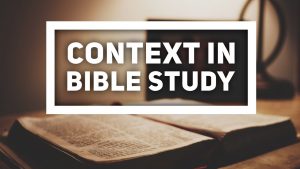
Shownotes
Welcome to Day 1534 of our Wisdom-Trek, and thank you for joining me.
This is Guthrie Chamberlain, Your Guide to Wisdom
Bible Study – Context Is King, Not Impressions – Meditation Monday
Wisdom - the final frontier to true knowledge. Welcome to Wisdom-Trek! Where our mission is to create a legacy of wisdom, to seek out discernment and insights, to boldly grow where few have chosen to grow before. Hello, my friend; I am Guthrie Chamberlain, your captain on our journey to increase Wisdom and Create a Living Legacy. Thank you for joining us today as we explore wisdom on our 2nd millennium of podcasts. This is Day 1534 of our Trek, and it is time for Meditation Monday. Taking time to relax, refocus, and reprioritize our lives is crucial in order to create a living legacy. For you, it may just be time alone for quiet reflection. You may utilize structured meditation practices. In my life, Meditation includes reading and reflecting on God’s Word and in prayer. It is a time to renew my mind, refocus on what is most important, and making sure that I am nurturing my soul, mind, and body. As you come along with me on our trek each Meditation Monday, it is my hope and prayer that you, too, will experience a time for reflection and renewing of your mind.
We are continuing our series this week on Meditation Monday as we focus on Mastering Bible Study through a series of brief insights from Hebrew Scholar, Dr. Michael S. Heiser. Our current insights are focusing on accurately interpreting the Bible. Today let us meditate on:
Bible Study – Context Is King, Not Impressions
· Insight Forty-Three: Context Is King
We spend a lot of time talking about interpreting the Bible in context. The Bible is often interpreted out of context in some way. I’m not exaggerating. When you know what’s meant by “context,” it’s hard to think otherwise.
When most Bible-believers hear someone insist the Bible be interpreted in context, they usually presume the point is that whatever verse or verses they’re reading or the pastor is preaching about needs to be interpreted in light of the verses that precede and follow. While that’s true, the verses before and after are just one context that needs consideration. Every biblical passage has multiple contexts. There is never only one context for interpreting the Bible.
The worldview of the biblical writers is a fundamentally important context in which the Bible must be interpreted if it is to be accurately understood. The proper worldview context for interpreting the Bible is not evangelicalism, Catholicism, the Protestant Reformation, the Puritans, or even the modern world.

The proper context for interpreting the Bible is the context in which it was written—that of the ancient biblical writers. Every other worldview is foreign to the Bible. In context means we must do our best to think as the writers thought.
Another context for interpretation is a literary context or genre. A genre is a type of literature. Frankly, without knowing the genre, an accurate interpretation of word meaning is impossible. For example, if we saw the word “descent” in a document, it would matter a lot if that document were a genealogy, a landscape architect’s plan, a flight instructor’s manual, or a doctor’s note about a grave illness. Those are all genres—kinds of writing. It’s easy to see how they dictate meaning. Just as today, there were many different genres used in the Bible by the writers.
Lastly, every word has its own context in relation to other words. If you look it up in a dictionary, the word “run” has dozens of meanings. It can be a verb or a noun. We only know what part of speech it is when we see the other words around it in a sentence. That knowledge, along with different contexts, helps us comprehend the intended meaning.
All of the above and more is why I like to say we need to interpret the Bible in contexts. There’s more than one, and, collectively, context is king.
· Insight Forty-Four: Impressions Are No Substitute for Data

Good Bible study should affect the way we think and feel. Naturally, the process of discovery in Bible study will appeal to the intellect because we learned something. There’s more to the life of the mind than the accumulation of facts. Other things are going on inside our heads besides information storage. Our emotions, attitudes, and imaginings are just as much part of our inner life as processing power.
All the aspects of our thought life need to be informed by good data, that is, things that are true and correct. Without real facts, our feelings, beliefs, and actions can be prompted by flawed catalysts. In the case of the Bible, truths that mold us in all these ways must derive from the biblical text. They cannot be the result of impressions or suspicions about something that might be biblical.
Bible studies can easily be derailed by putting impressions on an equal (or superior) footing with data drawn from the biblical text. Attempts to calculate the return of Jesus are an excellent example of this. The biblical text tells us that no one knows the “day and hour” of the Lord’s return (Matthew 24:36), but that hasn’t stopped a lot of Bible teachers and students from thinking otherwise.
I’ve had many strange ideas come across my desk that can be filed under “interpretation by impression.” I’m convinced that cable television and social media is the root cause for most of them. Examples include: Asteroids have hit the earth in the past—I wonder if that’s what caused the flood? Parts of the desert have been irrigated in Israel—I’ll bet that has something to do with Israel’s prophecy.
Speculating, especially about antiquity, is fun. I enjoy it as much as the next person. The serious Bible student must clearly distinguish between speculation and exegesis. The latter is the domain of the biblical text; the former is not. What you believe can be either coherently traced to the text or not. Building aptitude in Bible study will keep you oriented to that standard.
Study this Book of Instruction continually. Meditate on it day and night so you will be sure to obey everything written in it. Only then will you prosper and succeed in all you do.
That is a wrap for today’s Meditation. Next week we will continue our trek on Meditation Monday as we take time to reflect on what is most important in creating our living legacy. On tomorrow’s trek, we will explore another wisdom quote. This 3-minute wisdom supplement will assist you in becoming healthy, wealthy, and wise each day. Thank you for joining me on this trek called life. Encourage your friends and family to join us and then come along tomorrow for another day of ‘Wisdom-Trek, Creating a Legacy.’

If you would like to listen to any of the past 1533 daily treks or read the daily Journal, they are available at Wisdom-Trek.com. I encourage you to subscribe to Wisdom-Trek on your favorite podcast player so that each day will be downloaded to you automatically.
Thank you for allowing me to be your guide, mentor, and most importantly, I am your friend as I serve you through this Wisdom-Trek podcast and Journal.
As we take this Trek of life together, let us always:
- Live Abundantly (Fully)
- Love Unconditionally
- Listen Intentionally
- Learn Continuously
- Lend to others Generously
- Lead with Integrity
- Leave a Living Legacy Each Day
I am Guthrie Chamberlain….reminding you to ’Keep Moving Forward,’ ‘Enjoy your Journey,’ and ‘Create a Great Day…Everyday’! See you tomorrow!